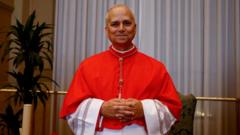In a surprising conclave decision, the church has elected its first American pope, Robert Francis Prevost, signaling potential changes ahead for global Catholicism.
Historic Election: American Cardinal Becomes First U.S. Pope

Historic Election: American Cardinal Becomes First U.S. Pope
Pope Leo XIV marks a significant shift in the Catholic Church’s leadership landscape.
The cardinals of the Roman Catholic Church have elected Robert Francis Prevost as the 267th pope, making history as the first pontiff from the United States. Prevost, now known as Pope Leo XIV, was chosen after a two-day conclave held in the historic Sistine Chapel, with the momentous announcement represented by a plume of white smoke signaling a conclave conclusion.
Prevost's election challenges decades of tradition that suggested a pope from a global superpower was unlikely. Aged 69 and originally from Chicago, Prevost has a diverse international background, having served two decades in Peru where he became a naturalized citizen and rose to significant positions within the church.
His leadership within the American Order of St. Augustine reflects values of charity, support for migrants, and a focus on humility. In past statements, he made clear that being a bishop entails close engagement with the community, emphasizing the importance of suffering with and supporting the people he serves.
Pope Leo XIV faces critical challenges as he determines the future trajectory of the church. He must decide whether to uphold the progressive agenda initiated by his predecessor, Pope Francis, who advocated for greater inclusion and significant reforms until passing away last month.
The conclave, which was remarkable for having the largest assembly of cardinals in history, experienced varied opinions and challenges, including the need for consensus among a diverse group of electors who were largely appointed by Francis himself.
As global reaction unfolds, the Catholic Church stands on the brink of transformation under Pope Leo XIV, whose approach to leadership could reshape the institution in the years to come.
Prevost's election challenges decades of tradition that suggested a pope from a global superpower was unlikely. Aged 69 and originally from Chicago, Prevost has a diverse international background, having served two decades in Peru where he became a naturalized citizen and rose to significant positions within the church.
His leadership within the American Order of St. Augustine reflects values of charity, support for migrants, and a focus on humility. In past statements, he made clear that being a bishop entails close engagement with the community, emphasizing the importance of suffering with and supporting the people he serves.
Pope Leo XIV faces critical challenges as he determines the future trajectory of the church. He must decide whether to uphold the progressive agenda initiated by his predecessor, Pope Francis, who advocated for greater inclusion and significant reforms until passing away last month.
The conclave, which was remarkable for having the largest assembly of cardinals in history, experienced varied opinions and challenges, including the need for consensus among a diverse group of electors who were largely appointed by Francis himself.
As global reaction unfolds, the Catholic Church stands on the brink of transformation under Pope Leo XIV, whose approach to leadership could reshape the institution in the years to come.























